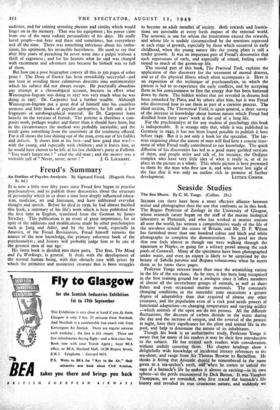Freud's Summary
IT is now a little over fifty years since Freud first began to practise psychoanalysis, and to publish those discoveries about the structure of personality which in so short a time have deeply influenced educa- tion, medicine, art and literature, and have infiltrated everyday thought and speech. Before he died in 1939, he had almost finished this book, a summary of his life's work which is here published for the first time in English, translated from the German by James Strachey. This publication is an event of great importance, for in spite of the additions and modifications made by other psychologists such as Jung and Adler, and by the later work, especially in America, of the Freud Revisionists, Freud himself remains the source of the new knowledge, the primary reference book of the psychoanalyst ; and history will probably judge him to be one of the greatest men of our age.
His latest book is divided into three parts. The first, The Mind and Its Workings, is general. It deals with the development of the normal human being, with that obstacle race with prizes by which the primitive and instinctive creature that is born struggles
to become an adult member of society. Both rewards and frustra- tions arc inevitable at every fresh impact of the external world. The neurotic is one for whom the frustrations exceed the rewards, and whose life is unduly circumscribed by the emotions repressed at each stage of growth, especially by those which occurred in early childhood, when the young nature like the young plant is still a tender growth. It was an important part of Freud's discoveries that such repressions of early, and especially of sexual, feeling condi- tioned so much of the grown-up life.
The second part of this book, The Practical Task, explains the application of this discovery for the treatment of mental distress, and so of the physical illness which often accompanies it. Here is an exposition of the technique of psychoanalysis, in which the patient is led to re-experience the early conflicts, and by accepting them in his consciousness to free the energy that has been battened down by them. The hidden wishes that are revealed in dreams had been remarked by Plato, and by others after him, but it was Freud who discovered how to use them as part of a curative process. The third section, The Theoretical Yield, is again general, a short survey of the increase in knowledge about human nature which Freud had distilled from forty years' work at the end of a long life.
For the psychoanalyst or for any student of psychology this book is indispensable. It is strange only that, while it was published in Germany in 1940, it has not been found possible to publish it here before 1949. But it is not only a book for the specialist. The lay- man enquiring about the nature of man will find here a concise state- ment of what Freud really contributed to our knowledge. The quick diffusion of his discoveries has led to a good many garbled versions of them, and people write and talk of, for instance, the Oedipus complex who have very little idea of what it really is, or of its place in the picture as a whole. This whole picture is here presented to them by the man who first saw it, and who never lost sight of the fact that it was only an outline rich in promise of further






























 Previous page
Previous page